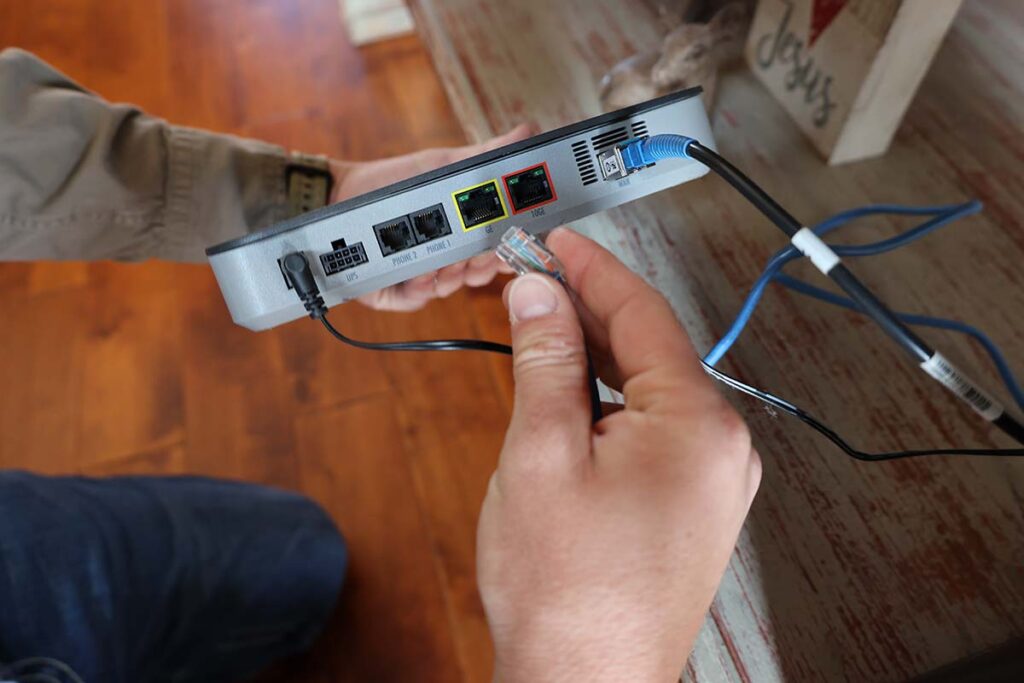
Sean McGrath started streaming movies at home in northeast Mississippi 15 years ago. Now his teenage son plays virtual reality games at the speed of light. Fortunately, their electric cooperative is not only keeping up with their demands today but anticipating the broadband their quality of life will require tomorrow.
Alcorn County Electric Power Association, based in Corinth, covers its entire 19,000-meter electric territory with internet service up to 10 gigabits per second through fiber-optic technology known as XGS-PON or 10-Gigabit Symmetrical Passive Optical Networks, considered the fastest residential internet speed within the industry today.
“Every home in our territory is fiber-eligible,” said McGrath, chief financial officer of ACE Power, which began connecting members within 18 months of breaking ground on its fiber network in 2020. “We think that that’s a big, big selling point for our city, county and region. In fact, it’s been so successful that we are venturing off system.”
ACE Fiber, the co-op’s broadband arm, is preparing to pass fiber by another 10,500 homes and businesses in New Albany, about an hour south, and eyeing more residential connections around Blue Springs, home to Toyota Motor Manufacturing of Mississippi Inc.
Within the co-op’s territory, mom and pop businesses are seeing a bump in online customers outside the state. And more members with ACE Fiber are working from home, including for Silicon Valley giants Google and Facebook, leaving “no doubt” that the economic uptick in portions of the county that were unserved or underserved stems from broadband, McGrath said.
“It’s pretty amazing,” he said. “It’s a great selling point for rural Mississippi.”
ACE Power’s 2020 decision to be an early deployer of XGS-PON was a matter of dollars and sense, applying to broadband the computer speed theory of Moore’s Law that transistors should be doubled on an integrated circuit every two years.
“We didn’t want to have to face a rip-and-replace within the first five years of our build,” McGrath said.
The co-op also compared the cost of installing 10-year-old GPON optimal network terminal (ONT) technology with the speedier XGS-PON.
“The conclusion we came to was absolutely we can [afford XGS-PON], because what we can’t afford is when that customer wants to go from 1-gig to a 2-gig service, we’d have to roll a truck and change out that ONT, and now we don’t,” he said. “It’s already in the home.”
Then there was the competition.
The cable company offered download/upload service up to 200/20 megabits per second, but “had really neglected this area for some time,” McGrath said. “Because of that competition, we wanted to be able to offer speeds where we could incrementally leapfrog Comcast if they decided to go to a gig.”
ACE Fiber offers three speed tiers, but about 70% of its 7,500 subscribers take 1- or 2-gigabit internet service.
“It’s going to be probably another two or three years before we have to look at our speed tiers and start adjusting those and go up to a 10-gig tier,” he said.
For electric co-ops just entering broadband or expanding their network, McGrath said he highly recommends going the XGS-PON route.
“You want to be able to have something that differentiates you from the competition,” he said. “I would not hesitate to recommend that a co-op go XGS-PON at this point.”
Access to unbeatable broadband is also key to growing a strong community with vibrant opportunities, McGrath said.
“Growth is being able to provide a place where my kids can come back after they go to school and gain some employment,” he said. “Whether they’re working for a hometown company or whether they’re working from home for someone in Denver, Colorado, being able to do that and have those options I think is important.”
Cathy Cash is a staff writer for NRECA.